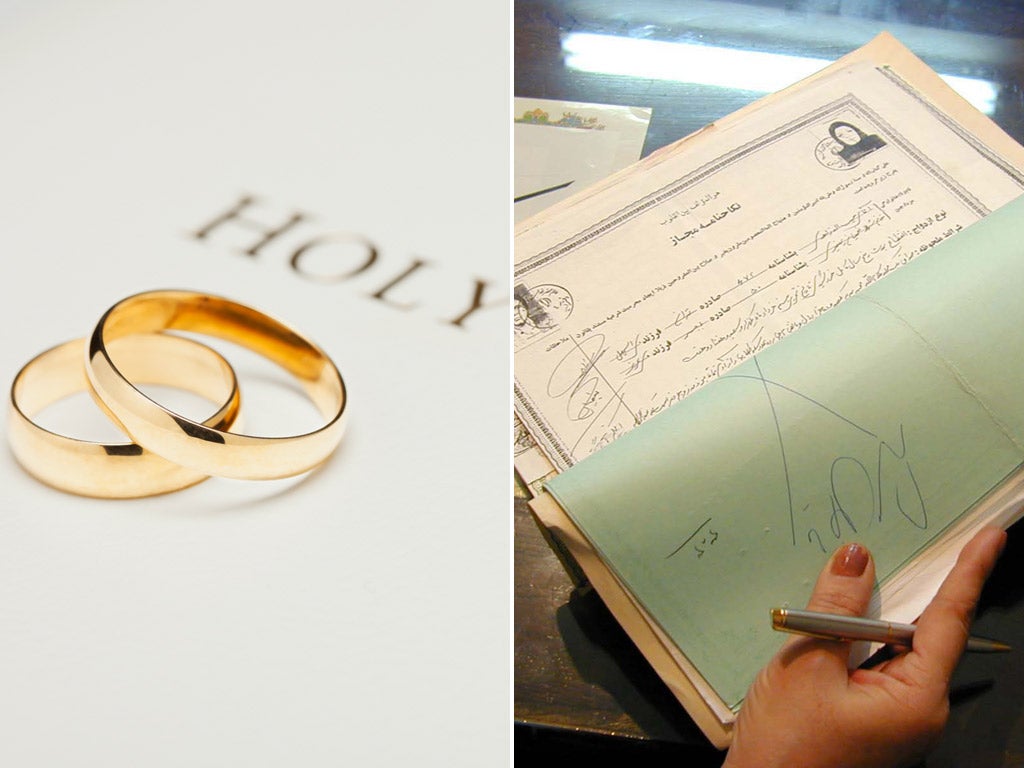How Christians and Muslims can marry – the official guide

Christian pastors and Muslim imams have come together to draw up guidelines detailing advice on how to deal with inter-faith marriages.
Although marrying between faiths is entirely legal in Britain, couples often face resistance and hostility, both from family members and religious leaders. Occasionally both Muslims and Christians feel pressure to convert to another's faith in order to avoid fallouts and ostracism.
The new guidelines by the Christian-Muslim forum reinforce the need for religious leaders to accept inter-faith marriages and warn that no one should ever feel forced to convert. The publication of the document, which will receive a high-profile launch at Westminster Abbey today, is significant because those supporting it include imams from the more orthodox Islamic schools of thought and evangelical Christians.
Among those who have signed up to the document include Sheikh Ibrahim Mogra, a prominent Leicester-based imam from the conservative Deobandi school, the Right Rev Paul Hendricks, associate bishop of Southwark Catholic Archdiocese, and Amra Bone, one of the only women in the country to sit in a Sharia court.
Estimating the number of people in mixed-faith marriages is difficult. The 2001 census suggests 21,000 but demographers believe the figure is considerably higher.
The document, called When Two Faiths Meet, is the product of months of painstaking negotiations between Christian and Muslim leaders and emphasises the need for tolerance and acceptance of mixed-faith marriages.
Among the recommendations are speaking out against forced conversions, recognising the legality of inter-faith marriages in British law, non-judgemental pastoral care and a complete rejection of any violence.
"It might sound a little like we are stating the obvious but it does need to be said," Sheikh Ibrahim told The Independent. "In reality Christian and Muslim couples often face very challenging scenarios where there is not enough tolerance or the right pastoral care and that can lead to a very damaging and negative experience for them."
The Leicester-based imam said clerics were motivated to come up with the guidelines because they were seeing increasing numbers of inter-faith marriages over the years.
"It's clearly already an issue and something that will become more and more common," he said. "It makes sense for pastors and imams to be ready for such situations rather than be left without help of guidelines when they get approached by couples seeking their advice."
Those with experience of inter-faith marriages say couples often face a variety of difficulties. In Islam, men are allowed to marry "people of the book", Christians and Jews. But Muslim women are not allowed to marry outside their faith. Many of the more conservative or evangelical Christian denominations, meanwhile, insist spouses convert or promise to bring their children up as Christians.
Heather al-Yousef, a counsellor with Relate who married a Shia Muslim man, was one of those asked by the Christian Muslim Forum to give advice for the guidelines.
"There are, of course, a whole range of Muslims and Christians. Some groups are liberal about mixed marriages, others much more proprietorial. The good news is that Christians and Muslims are increasingly recognising the need to talk about these things. The very fact we've got so many people talking is in itself a success."
'We were shocked by how much we were judged' harshly and told off'
Happily married for five years this couple (the man is Catholic and the wife Muslim) struggled to find support
While we came from different faiths, we approached them in similar ways. Although I was in my 30s and well educated, I was treated as though I was a silly little girl who had got herself into an irresponsible situation which could only be solved by my fiancé converting.
It was also assumed that although my fiancé was Catholic, his religion was less important and that he likely did not believe in it to the same degree Muslims believed in their religion. We were not asked what drew us together, how we met, how we managed differences. Instead we were judged harshly and told off. We had discussed the option of one of us converting but decided this was not for us.
We were shocked by how divisive and underhanded some Muslim clerics were. Ultimately, we found a Muslim cleric who saw things the way we did. The counsel he gave us was excellent, focusing as we did on what made us similar.
Join our commenting forum
Join thought-provoking conversations, follow other Independent readers and see their replies
Comments